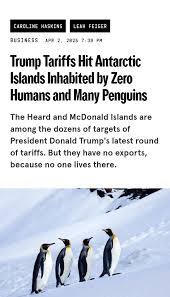The Impact of Donald Trump’s Tariffs on Penguins

Introduction
In recent years, environmental concerns have gained significant attention worldwide, intersecting with political and economic policies. One notable example is how Donald Trump’s tariffs, introduced during his presidency, could potentially affect wildlife, including beloved species like penguins. As discussions around tariffs persist in the wake of ongoing trade disagreements, understanding their implications for conservation efforts and wildlife protection has never been more crucial.
Trump’s Tariffs Overview
During his presidency, Donald Trump implemented a series of tariffs primarily targeting imports from countries such as China, Canada, and Mexico. The aim was to protect American industries and reduce trade deficits. While these tariffs have been extensively debated in terms of their economic impact, less attention has been paid to how they could indirectly influence wildlife and conservation initiatives.
Effects on Conservation Funding
One significant concern is the impact of tariffs on conservation funding. Many organisations rely on international partnerships and support to fund projects aimed at protecting endangered species, including penguins. Increased tariffs can lead to strained international relationships, potentially reducing funding and support for vital conservation efforts.
Impact on Biodiversity
Moreover, tariffs can cause fluctuations in global markets for resources crucial to conservation. For instance, if tariffs raise the cost of materials needed for building infrastructure in wildlife reserves, it may result in less effective conservation strategies. Penguins, particularly species such as the Emperor and Adélie penguins in Antarctica, face habitat threats from climate change and human activities. Reductions in funding could exacerbate these threats, putting populations at further risk.
International Response and Future Outlook
International collaboration is essential for effectively addressing wildlife conservation challenges, and tariffs can hinder this cooperation. As nations negotiate trade agreements and implement tariffs, their wildlife policies could suffer as a result. The need for a holistic approach that fuses economic policy with environmental stewardship is becoming increasingly evident.
Conclusion
While Donald Trump’s tariffs were primarily aimed at reshaping the economic landscape of the United States, their potential indirect effects on global wildlife, including penguins, must not be overlooked. As nations continue to grapple with trade issues, it is essential for policymakers to consider the broader implications of their decisions on wildlife conservation. Moving forward, enhanced awareness and proactive measures must be taken to ensure that wildlife protection remains a priority amidst shifting economic policies.









